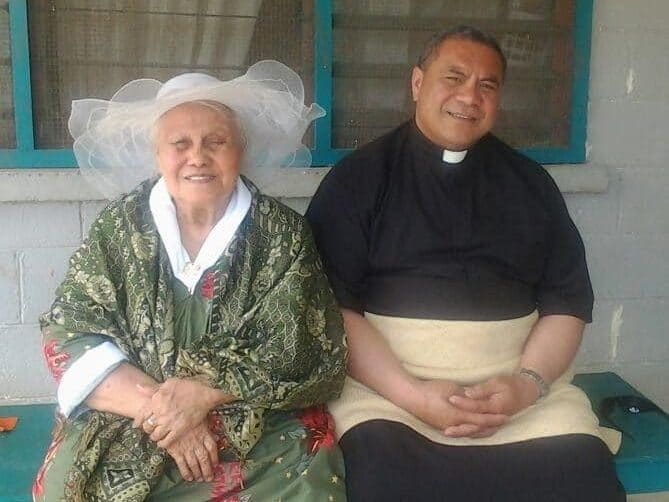
By Stephen Cauchi
29 January 2022
The Reverend Siosifa Tongia had called his mother in Tonga for her 87th birthday when the line suddenly cut out.
It was the first sign for him of a major disaster which was hitting the island nation: a volcanic eruption, followed by a tsunami.
An hour later Mr Tongia reached his family again, as they travelled to higher ground. After that call cut out, he did not know if they were safe until days later, when his sister managed to access a satellite phone.
All Mr Tongia had was news reports, and images uploaded to social media before communications cut out.
“I have a strong faith, but the news was awful – the volcano had 500 times the force of the Hiroshima bomb,” he said.
“Still, I did not waver one per cent in my faith thinking that Tonga would disappear or that my family would suffer.”
Read more: Anglicans launch appeal for ‘unprecedented’ Tonga disaster
Vicar of Melbourne’s St Albans Anglican Church, Mr Tongia urged Australians to donate money and goods to the appeal on the island.
Mr Tongia’s mother, three sisters and one brother live in Tonga, while his other brother lives in Victoria.
As the volcano erupted on Saturday 15 January on the phone to his mother in Tonga, talking and singing happy birthday. Then, the phone cut off. Mr Tongia tried to call her again, but couldn’t get through.
“I waited and I waited, and I couldn’t get through. I didn’t know what had happened. I kept trying and trying but I couldn’t get through,” he said.
After an hour, Mr Tongia said he managed to reach his family. A sister told him what happened: while they were talking there was an explosion, then communications had blacked out.
Mr Tongia said that after the volcanic explosion there was panic on the island as people headed to high ground to avoid a tsunami. When he next spoke to his family, they were travelling to a high place on the main island.
But it was difficult to move anywhere, because people were panicking. There was bumper-to-bumper traffic on tiny roads to get to the higher parts of the main islands.
It took his family more than three hours to travel three kilometres in the traffic.
“They could hardly move – all the traffic was crammed on the tiny street but luckily they were able to be diverted from the main road,” he said.
By this stage, ash and small rocks from the volcano were falling on the island. Mr Tongia said people panicked, as no one had experienced this before.
“There was panic as people had no experience about that type of situation.”
When the second phone call cut out suddenly, Mr Tongia feared the worst. All he knew was from photos uploaded to social media before the nation’s communications cut out.
Read more: New chief executive announced for Anglican Overseas Aid
Mr Tongia and family members in Sydney, Queensland and New Zealand tried to get in touch in Tonga, but could not.
“We were all the same. It’s not only here, the whole Tongan communication [system] was cut off from the world,” he said.
“I was very stressed. I was not sleeping day or night. I kept awakening and wished that I heard from them.”
Finally, five days later on Thursday 20 January, one of his sisters in Tonga managed to call him.
It was a very lucky break. His sister, who worked for a Tongan communication company, had managed to find someone with a satellite phone – the only means of communication at that point.
With the satellite bandwidth absolutely crammed, the phone conversation was short before it cut out. But she told Mr Tongia his family were all safe and well. They had been able to shelter with his eldest sister, a nun, in her convent.
A day later, his sister called again.
“On Friday evening my sister called again and passed the phone to my mother. And it was the best gift that I ever had in my life, when I heard my mother. She was fine,” Mr Tongia said.
By that stage, ash and dust had covered not only Tonga’s main island, but its surrounding islands as well. Mr Tongia said his family had to deal with ash and dust everywhere as best they could, with no proper equipment.
Fortunately, his family’s homes all survived intact. Only his younger sister’s home – less than 200 metres from the beach – suffered saltwater damage.
Mr Tongia said he was glad to see that Tonga’s main island was relatively undamaged.
He said his sister told him not to worry about the food and water situation, but he knew in the long-term they would need support.
He said he was trying to arrange a program in Australia to transport shipping containers filled with goods to Tonga, similar to programs in New Zealand.
Mr Tongia said donations of money were also welcome, but many shops and stores were damaged and closed.
To donate to Anglican Overseas Aid’s Tongan appeal, please contact: anglicanoverseasaid.org.au/donate-online/







